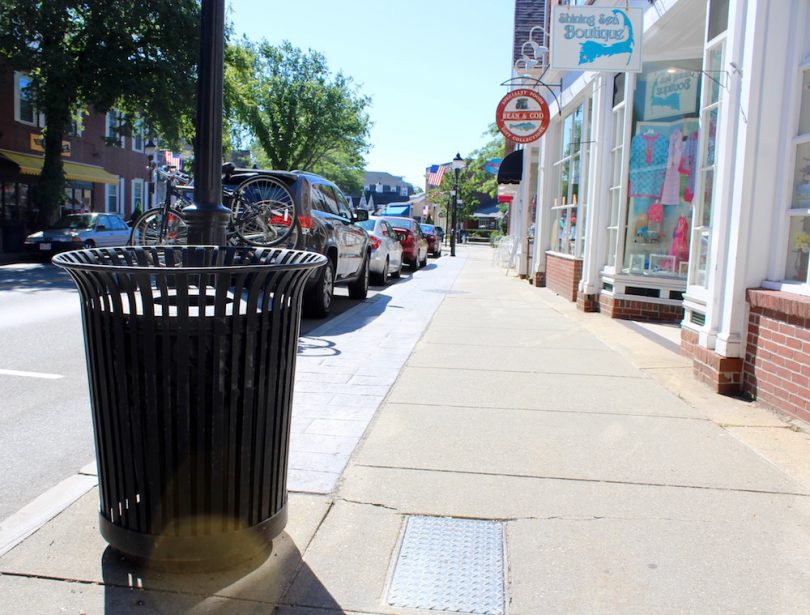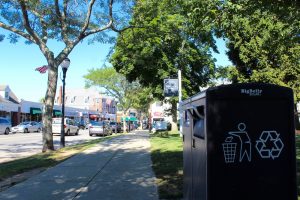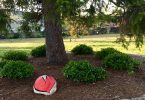The ad on Craigslist caught the eye of Jillian Macura of Stoneham, a 22-year-old recent graduate of UMass Amherst.
“Environmental Community Outreach Intern: This is a unique flexible summer internship for someone interested in local environmental advocacy and education of local businesses for sustainable practices.”
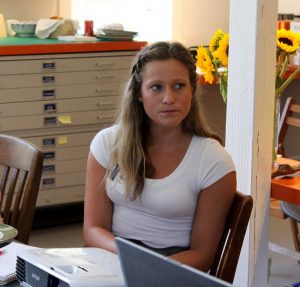
Jillian Macura has been working this summer for architect Jill Neubauer as an Environmental Community Outreach Intern.
Macura had majored in economics with a minor in environmental science and natural and environmental economics. The internship sounded up her alley.
She applied and was hired by Falmouth architect Jill Neubauer to research eco-friendly purchasing options and then try to convince local businesses to be switch to more eco-friendly practices, including recycling.
That is why Macura can be seen walking up and down Falmouth Main Street this week visiting restaurants and ice cream parlors armed with specially produced booklets explaining Neubauer’s initiative, entitled “Buy Better Toss Smarter.”
The goal according to the booklet is, “to support Falmouth restaurants in their efforts to adopt better purchasing and recycling practices.”
This is not Neubauer’s first foray into trying to help businesses be more eco-friendly.
She was also behind a project a few years ago that resulted in Cape & Islands Green, a certification for “green” businesses.
That effort, Neubauer said, came out of being frustrated when ordering a to-go sandwich and not being able to recycle the packaging.
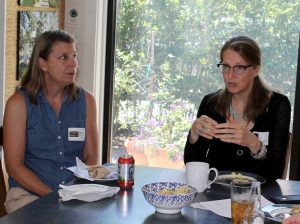
Jill Neubauer, right, an architect, wants to encourage businesses in Falmouth to recycle. To her left is Mary Ryther of West Falmouth, who owns the business, Compost With Me.
That frustration continues as she gets take-out at restaurants and the containers are made of styrofoam, a petroleum-based plastic that is non-biodegradable and by some accounts, appears to last virtually forever. In addition, the process to produce styrofoam pollutes the air and its chemicals are thought to leach into food, Neubauer said. Styrofoam is also a main source of marine debris.
Neubauer wanted to give restaurants information about alternatives to styrofoam. But with a busy office focused on architecture, she decided to hired a paid summer intern to concentrate on an eco-friendly packaging education and advocacy campaign.
“If I wasn’t an architect, I’d be working in enviromental advocacy,” Neubauer said.
![]() Taking The Message to Main Street
Taking The Message to Main Street
Macura’s goal is ultra focused: to let businesses—specifically restaurants—know that switching to eco-friendly to-go containers can be good for business and the community.
“My goal is if just a few businesses can just take the time when the summer rush is over to really consider making the switch to more sustainable to-go packaging and recycling, I think we would have accomplished a lot,” she said.
“I’ve been amazed on the Cape with the passion. People get really riled up when you talk about trash.” David Quinn, Barnstable County Regional Waste Reduction Coordinator.
Macura said businesses she has visited so far have been open to her spiel.
“So far so good. Most people are receptive and hearing me out and taking the booklet,” she said. The booklet, made of 100% post-consumer fiber—natch—gives options for to-go containers cutlery, to-go bags, as well as information on why recycling is important, tips for getting started, and why the effort benefits the community.
Macura has visited 20 restaurants so far, about halfway to her goal. She is visiting restaurants and ice cream shops on Falmouth’s Main Street and in Woods Hole.
Macura said there are basically two responses, people who believe that eco-friendly is a waste of money and people who are on the fence and open to the idea but who don’t have time to research the costs.
That’s where the Buy Better Toss Smarter campaign can help. Macura has already done the legwork to source local vendors who sell eco-friendly containers along with the costs. All that’s left for the business is to make the switch.
Among those businesses open to the eco-friendly message is Pickle Jar Kitchen, a breakfast and lunch spot across from Falmouth Town Hall.
The Pickle Jar recycles and already uses eco-friendly to-go containers.
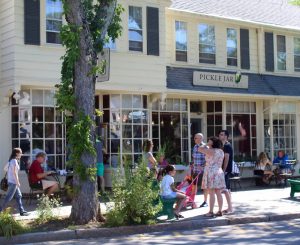
The owners of Pickle Jar Kitchen try to be as eco-friendly with their to-go containers and also by recycling.
Casey Gallant, one of the owners of the Pickle Jar Kitchen, said the reason she wants the business to be eco-friendly goes back to Gandhi’s saying, “Be the change that you wish to see in the world.”
Gallant said, “Every bit does help and it’s amazing to see how much stuff we actually recycle in a day, never mind a month or year.”
Gallant said recycling involves a bit more organizing than just throwing everything away in the trash.
“We have a separate cardboard area, a redemption recycling area and a place for all other plastic containers. Everything needs to be emptied periodically throughout the day and then brought to their assigned areas,” she said.
The restaurant has a weekly pick up from Cavossa Disposal for all recycling except cans and bottles, which they deal with separately.
“You can arrange for extra pick ups for an additional cost depending how much you have. The upside to this is we have less trash going into the dumpster that could have been recycled,” Gallant said.
That leads to one message that Neubauer is trying to get across. Eco-friendly behavior has a number of benefits. Reducing waste is one of them. Others, from the Buy Better Toss Smarter booklet are saving resources, conserving energy, protecting raw materials, and demonstrating a commitment to a sustainable community and protected environment.
A particular pet peeve for Neubauer is why there are not more recycling trash bins on Main Street.
Gallant said that is also an issue for them at Pickle Jar.

Buy Better Toss Smarter is the name of a eco-friendly packaging and recycling campaign conceived by Falmouth architect Jill Neubauer. She hired an intern this summer to help put together a booklet that gives details on eco-friendly purchasing options for local businesses.
“It would be really great if the town would consider putting more user-friendly containers around town. People leave stuff all over our outside tables at night and we end up putting it into our recycling which does come with a cost for us,” she said.
Then there is the matter of to-go containers, an issue that Neubauer has focused on for her campaign, trying to get restaurants to replace styrofoam in favor of more eco-friendly packaging.
At the Pickle Jar, they are already on board with eco-friendly to-go containers and they have new reuseable bags because of the town’s plastic bag ban.
“We are trying to encourage people to bring their own bags when picking up takeout orders. We just invested in some reusable Pickle Jar bags,” Gallant said.
But that also comes with a cost. “Now that the plastic bag ban has moved forward in town, it will cost restaurants a lot more money to package into brown paper,” she said.
But she said she hopes the ban will encourage people to bring reuseable bags when they go shopping.
The Buy Better Toss Smarter campaign’s message on recycling is a numbers game. Macura said that trash hauling companies Cavossa and Republic offer recycling pick up at a cost of about $25 to $35 per month for a 96-gallon barrel, depending on the frequency of pick up.
The benefit for businesses is that recycling means they have less trash, Macura said, and that can reduce the cost of their trash pick up. Macura said that additional $25 to $35 per month for a business seems a reasonable cost, even for a small business.
“I don’t think it would break the bank and it would make a big difference,” she said.
Macura shows business owners photos of how much waste is going to a landfill and points out that non-recycleable waste takes about 1,000 years to break down.
“With the plastic bag ban going into effect in Falmouth . . . we’re hoping that the timing is ripe for a shift in mentality to revisit businesses’ commitment to the environment.” Meredith Hunnibell, administrator for Jill Neubauer Architects
Besides Pickle Jar, Macura said other businesses open to the Buy Better Toss Smarter message have included Parkside Market, Liam Maguire’s Restaurant & Pub, and the french bakery, Maison Villatte. “They’ve already started making the switch,” she said.
Cape Cod Bagel Bakery is a model for the program, Macura said. When Macura went to drop off a Buy Better Toss Smarter booklet, a sales representative for eco-friendly packaging happened to be at the restaurant and was thrilled about the effort, Macura said.
But being eco-friendly can also be challenging for businesses.
“We do our best to minimize our carbon footprint,” Steve Vannerson, owner of Bean and Cod, said, but he added that the challenges for businesses in being more eco-friendly have to do with manpower, suppliers and the product mix the restaurant uses.
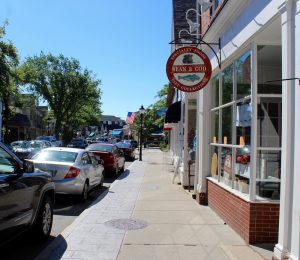
Steve Vannerson, owner of Bean and Cod, said there are many challenges for businesses in trying to be eco-friendly.
Vannerson said when Neubauer came into his shop for lunch one day and brought up her plan to approach restaurant owners about being more eco-friendly, he suggested she call suppliers and get the costs before approaching businesses.
For example, he said, purchasing eco-friendly drinking cups that are made with cornstarch might cost 22 cents as compared to a traditional cup that costs 12 cents for the same size.
According to Vannerson, switching to eco-friendly products is fraught with obstacles for businesses. “There are many, many, many things that go into eco-friendly,” he said. And then there is another rub, he said: “Whether it is really appreciated by your customers.”
Vannerson’s comments inspired Neubauer to do the purchasing homework for businesses. She tasked Macura with researching local businesses with reasonably priced eco-friendly products and those costs and contacts are all listed in the Buy Better Toss Smarter booklet
Macura worked on the booklet with Neubauer and Meredith Hunnibell, Neubauer’s office administrator.
Hunnibell said the effort to encourage businesses to be eco-friendly was also spurred on by the vote by Falmouth Town Meeting to ban plastic bags. The ban went into effect on August 6, 2016.
“With the plastic bag ban going into effect in Falmouth . . . we’re hoping that the timing is ripe for a shift in mentality to revisit businesses’ commitment to the environment,” Hunnibell said.
Along with the Buy Better Toss Smarter campaign and Macura’s outreach to businesses, Neubauer also wants to approach the town about increasing recycling on Main Street.
Hunnibell said they want the town to, “take a more serious stance about recycling in that there are no recycling bins along Main Street other than a couple that are being managed by volunteers.”
Those two bins, which are solar-powered recycling bins located at Peg Noonan Park, are managed by Falmouth Service Center volunteers who use the income from the recycling for the nonprofit center, according to Peter McConarty, Deputy Director of Falmouth’s Department of Public Works.
The barrier to having more recycling bins on Main Street, McConarty said, is lack of staff. There is limited staff to deal with the fact that people put trash in the recycling bins.
But he said the DPW wants to improve recycling in town.
“Selectmen and DPW need to come together,” McConarty said.
![]() Talking Trash at Lunch & Learn
Talking Trash at Lunch & Learn
Last month, Neubauer held a “lunch and learn” session on recycling, inviting town officials to her Depot Avenue office. She hosted McConarty, as well as Falmouth DPW Superintendent of Highways James F. Grady Jr. and Falmouth Selectman Sam Patterson.
Patterson said he is in favor of increasing recycling. In fact, he said, as a teacher, he led efforts at recycling at his school.
“I’m 100% behind this from an environmental standpoint. I’m passionate about it,” Patterson said. But he said cost is a critical factor. “With the Wind I turbine shut down, the town is facing additional costs of $400,000 per year,” he said.
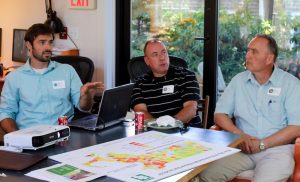
David Quinn, Barnstable County Regional Waste Reduction Coordinator, gives a presentation at Jill Neubauer’s office, to town officials, including James Grady, Superintendent of Highways, and Peter McConarty, Deputy Director of the Falmouth Department of Public Works.
At the lunch and learn session, Neubauer invited David Quinn, Barnstable County’s Regional Waste Reduction Coordinator, to give a presentation about recycling efforts across the Cape. Quinn said it costs the Cape $5.6 million per year to dispose of 75,000 tons of trash a year.
He explained that every two years a waste categorization study is conducted to determine what waste is ending up in landfills that could be diverted to recycling. The most recent breakdown of materials that could be diverted is 25% paper, 20% organic material, 14% plastics, 13% construction & demolition debris and 5% metals.
“Over 70% of trash can be recycled. It’s just being burned and buried,” Quinn said.
Waste from the town of Falmouth is buried in a landfill in the town of Bourne, Quinn said.
Neubauer said, as a consumer, she liked it better when Falmouth’s trash went to the Covanta waste-to-energy facility in Rochester. “At least it will be turned into energy. Now it sits in the ground for 1,000 years,” she said.
McConarty said there was a push in 2009 by Falmouth DPW Director Ray Jack to initiate Pay-As-You-Throw in Falmouth but there was resistance to the idea. Pay-As-You-Throw encourages recycling by restricting consumers to a certain amount of trash for free and extra trash comes with a charge. Charging for trash by usage uses the model of utilities wherein people pay for what they use.
Pay-As-You-Throw, Quinn admitted, has a marketing problem. “The first word is ‘pay,’” he said.
But, he added, it is the only program that has a big impact in reducing the amount of trash and increasing recycling. “You see a 50% reduction in trash the next day” after the program is implemented, he said.
The Falmouth Department of Public Works went so far as getting a $150,000 grant from the state Department of Environmental Protection to purchase 64-gallon totes for homeowners to use for their recycling as part of a Pay-As-You-Throw program, McConarty said. The idea was to increase recycling and reduce the amount of trash, thus saving the town in tipping fees in disposing of the trash.
But after citizens protested, selectmen opted not to go forward with the program, McConarty said.
Quinn said Cape Codders care about the environment, but people pay attention when there is a financial incentive to recycling. People also pay attention when the topic turns to trash. “I’ve been amazed on the Cape with the passion. People get really riled up when you talk about trash,” he said.
Neubauer is not dissuaded by passion against recycling; she intends to combat it by offering another perspective. She said she plans to attend the selectman’s meeting when they next discuss the issue to let them know there are residents who want the town to be progressive when it comes to recycling.
“It’s the right thing to do,” she said.
And echoing Gallant from Pickle Jar Kitchen, Neubauer said she believes strongly that individuals can make a difference. “What we’re trying to say is, your container matters,” she said.

